#and they are like ‘socialism is bad because that mean big government and big government is bad!!’
Text
I just wanna throw in my two cents on the idea that Danny is constantly running from the Justice League (and maybe Young Justice). Basically a list of reasons why he doesn’t trust them.
Reason number 1. Why allow an organization full of super-powered people that work with the same government that allows the Ghost Investigation Ward to take ghosts and perform sick experiments that might as well kill the ghosts inside and become the one thing practically every ghost fears to get anywhere near him? Let alone answer their questions?
Reason number 2. Even if they’re telling the truth about not knowing about the GIW, beginning attempts to overthrow the anti-ecto acts, and don’t turn him in, what if they they think he’s a bad guy because of the sheer number of social media posts that paint him in a bad light? What if he still ends up in a cell?
Reason number 3. Okay, so these two concerns are put to rest, but what about Batman? Why does he reek of tainted ectoplasm? Has he killed ghosts? It has to be a big number to be almost always smelling like it. Danny spent years cleaning up his parents’ lab, he can recognize the scent of murdered ghost from miles away.
Reason number 4. They just won’t leave him alone! No matter how many times he runs away from them! Like why do they keep coming back trying to interrogate him?! Can’t they just leave him alone?!
Reason number 5. Just regular and understandable hesitation to trust. I mean, new place, lots of new people, and a good bunch of them are suspicious of him? Danny thinks he’d be crazy not to be skeptical!
#danny phantom#danny fenton#dc x dp crossover#dc x dp#dp x dc#dp x yj#dp x dc crossover#yj x dp#reasons why Danny doesn’t trust the Justice League
782 notes
·
View notes
Text
Joel sits awkwardly at a family dinner table that isn’t for him.
It’s nice and all, he reckons, for Impulse’s family to invite him over after he leaves the hospital. Even before—everything—Joel’s family hadn’t really been the “big meal around a big table” type, so he’s getting some new experiences here too. And it’s nice and all, that they want to thank him for his role in finding Skizz.
But like. It’s not like he or Impulse or Skizz could explain how it happened, when asked. “Magic brain ghosts” and “evil butterflies” and “Joel still isn’t certain all of that was real and is trying to pretend it wasn’t” puts a damper on that. Also, adults are kind of shit at talking around the fact Joel’s whole family is dead, so he gets the sense he’s sort of harshing the vibes, you know?
Still. It’s a nice gesture. He guesses. It’s free food at least, which is decent, and as close as Impulse and Skizz are, every time one of Impulse’s family says something stupid, Skizz taps Joel’s leg with his foot or steals a roll or something, and it makes Joel feel…
He’d have been sad if Skizz had died, probably. Like, he wouldn’t know. He didn’t come here to make friends, he came here to get a degree and get out. Also, that’s stupid, because it’s not like Joel would have known he was missing a really awkward congratulatory family dinner in which Skizz kept on trying to sneakily steal beans. Probably would have just moved right on. He’s not… friendly.
But.
They stand outside afterwards, waving by to Impulse, promising to walk together so that neither of them Vanish. They’re quiet.
“Thanks, man. That meant a lot to them,” Skizz says.
“Yeah, well, I can do stupid things for free food,” Joel says.
Skizz laughs. “It was nice having you there, too. Man, they’re even worse with you! It’s like not knowing you means they’re even more awkward about family tragedy.”
“Trust me, most adults are way worse. You should see my social worker,” Joel says.
“Didn’t he ditch you, dude?”
“Haha, yeah, he did,” Joel says.
They stare up at the streetlamps together.
“I was really ready to go for a bit there,” Skizz says. Joel’s hackles raise. Oh no. Emotions. Bad. Go away. “It was like—man, it felt like the whole world was empty. But when you showed up, it’s like I remembered… I’d miss dinners, dude.”
“I have no idea why, that kinda sucked,” Joel says, baffled and sarcastic, because he’s a moron who can’t handle emotional conversations, this is why everyone avoided him at the funeral, stupid.
Skizz breaks out laughing.
“You’re great, man! I’m glad we met. Uh, my place is only a block away, and I won’t go following any stupid butterflies. See you at school?”
“Yeah man. See you,” Joel says—
I am thou.
Thou art I.
Thou hath formed a new bond.
With the power of the Chariot Arcana, you shall build the chains with which to hold on to reality.
RANK 1!
“What the hell?” Joel says, tripping over his feet. “What? What? Where did—what the fuck that wasn’t Pygmalion oh god do I have more than one voice in my head—”
“Dude, are you okay?”
Skizz’s almost frustratingly strong and comforting arms grab Joel.
“Tell me you heard that,” Joel says desperately.
“I—I don’t know what you’re talking about. I could take you back to the hospital—no?”
“I am either crazy or am going to end up in a government lab?” Joel says, voice getting high and squeaky.
“We can ask Mr. Hills about it? He came to talk to me after I woke up in the hospital, apparently he like, knows stuff,” Skizz says.
“I don’t wanna,” Joel says.
“Tough luck, buddy, you just almost fell over and cracked your head open!”
Suddenly, Joel remembers a long-nosed man and a blonde in a very blue boat. He remembers a cryptic conversation about bonds and power and their importance. He takes a deep breath. “Can you cover your ears for a moment?” he says.
“Yeah, sure thing, why—”
Joel, as loudly as he can, screams. He hears several birds fly away. He pants.
“…Joel,” Skizz says.
“Yeah thanks man don’t worry about it let’s never speak of this again I’m sure it’s nothing. I definitely didn’t have a weird dream about this and should go to bed.”
“Yeah, okay, whatever you say,” Skizz says cheerfully before laughing, which Joel continues grumbling about all the way back to his apartment.
#smallishsona au#joel smallishbeans#skizzleman#a bee fic#WELCOME CHARIOT ARCANA#figured I’d come poke this some more. still getting through the ‘opening tutorial’ part of the game.#this is where you’re railroaded through your first social link so you can learn how that mechanic works lol#I AM bending the rules by having it be skizz instead of the fool thanks for asking#I just think he deserves it.#also skizz being the first male friend also breaks the magician rule#but like. HE DESERVES IT.#and scar isn’t far off I can do what I want.
211 notes
·
View notes
Text
So, the thing about Ward's worldbuilding is, it's bad on purpose. This is something I didn't catch until a relisten of the earlier parts, but the disconnect between the actual literal apocalypse that occurred two years prior and the shockingly advanced levels of infrastructure and technology is very deliberate. The entire thing is slapdash and farcical. You have people out the door of a shitty concrete hovel lining up for bad coffee. You have cars built out of random scavenged parts, "dumpsters" that Victoria can't manhandle because they're made of clumsily-welded-together scrap metal. Victoria can't reliably navigate at night because power to the city below is intermittent (and her mother Carol happens to live in one of the parts that does have consistent power; that's unexamined, make of it what you will.) The mall cluster shitshow goes down in a "mall" that, IIRC, is called out later as having been basically a dead end economically, a doomed grasp at a sense of normalcy. The patrol block uses recycled PRT gear, Dot's interlude involves the machine army jumping a bunch of bog-standard apocalypse scavengers. What you're looking at isn't a new society built up shockingly quickly; you're looking at the previously-well-supplied-and-externally-supported outpost of the recently destroyed society, and after two years they're finally chewing through the last of the head start they got. The societal equivalent of Wile. E. Coyote hanging in the air above the cliff, or of the seemingly-untouched duelist seconds away from sliding in half. Unfortunately, due to choices made about the timeframe and focus of the story, the Coyote sprouts wings. The duelist whips out a staple gun.
Or to come at this from another angle- in The Walking Dead, a comic I really like, I can sort of organize the arc of the apocalypse into three-ish big chunks. For the first eight or nine months in universe, about 48 issues, things are obviously bad, right, quite a few people have died, but there's a sense among Rick and company that they might be able to ride it out, that things are on the upswing. They've got crops going, they have new births, maybe help from the government proper isn't coming the way they thought it might towards the start, but things are looking up! Then, of course, the Great Fuckening of Volume Eight occurs, and you enter the middle phase of the comic, where they're down to like a third of their group, they're food-insecure, they're constantly on the move, they're under attack from rapists and cannibals who've descended into habitual atrocity because they're totally without hope. Children are having mental breaks and killing children, the first friendly guy Rick met in the whole comic is now an insane hermit feeding dead bodies to his undead son, on and on and on and on and on. Bad times, but a comparatively short middle in the grand scheme of things. Then they find Alexandria, and the back half of the comic is spent basically on an upward trajectory with some zig-zags, there are still periodic existential threats but they're clearly past the nadir.
Ward feels like it starts midway through that first part, the you-don't-know-how-much-worse-this-can-get part, with the emphasis on the social tensions, the encroaching winter, but then it just...doesn't get much worse. I mean they have a rough three months, but then they sort of speedrun right to the hopeful future ending as soon as the titans are dealt with. There were parts that I suspect were supposed to be the dark-night-of-the-soul I'm alluding to but they didn't land as such. I feel as though the superhero genre stuff kind of subordinated the apocalypse stuff, made it less visible by virtue of whose POV we were following, and sometimes I feel that as a remedy to this, Ward should have taken place over the course of years, and it should have Just Kept Getting Worse. For example Breakthrough should have had to kill and eat Rain to survive the winter
#parahumans#ward#wormblr#thoughts#meta#the last line is a shitpost#everything else is endorsed#wildbow
319 notes
·
View notes
Note
RE "revolutionary leftists are revolutionary because they know they can't win electorally."
It astounds me a little that there are leftists who think that a communist revolution is more likely to work than, like, fifty years of community-building and electoral politics. Sewer socialism, union activism, and other boring activities have brought much more success in the U.S. than agitation for a revolution.
What I mean is, setting aside the moral concerns (violence is bad, even when it's necessary, and if there are practical alternatives then we should pursue them), I am not a revolutionary leftist because I think we would lose a revolution. For one thing, there is a considerable right-wing element in the country that is much better prepared for this kind of thing, and I think that the majority of the institutions in the U.S. would pick fascism over communism if they had to choose, but also, prolonged violent action is ripe for breeding authoritarianism.
Goatse is concerned that "the party" might "abandon or neglect its primary ends," but what is leftism if it is not, at bottom, an attempt to improve the living conditions of all people, et cetera et cetera? To the extent that social democratic parties successfully pursue this end to some degree, they're better than than an ostensible communist party that talks the talk but commits human rights abuses. And, more than the fact that U.S. leftism has some pretty fierce opposition that would probably fare better if The Revolution happened tomorrow, I think that, even in winning, we would lose, because what came out the other end would look a lot more like Stalinism.
I think one thing the hardcore revolutionaries in OECD countries don't realize is that the reason they can't marshal support for their revolutions is that the socialists won most of the issues that were salient in the early 20th century--workers got more rights, better pay, unions were legalized, etc., etc. But it didn't take restructuring the whole political economy to do it, which is immensely frustrating if you believe that any society without your ideal political economy is inherently immoral and impure, so in order to justify an explicitly communist platform you have to rhetorically isolate it from the filthy libs and feckless demsocs who it turns out have been pretty effective within the arena of electoral politics in which supposedly nothing can ever get done, and treat them as of a piece with the out-and-out fascists and royalist autocrats of the 1920s and 30s.
Which, you know. Is not persuasive to most people! Most people understand intuitively the vast gulf between the SPD and the Nazis; they see that, milquetoast and compromising though they may be, the center-left can deliver substantive policy improvements without the upheaval of a civil war or political purges, and this is attractive to people who are not of a millenarian or left-authoritarian personality.
Which isn't to say that communists don't often make important points! It sucks having to fight a constant rearguard action against the interests of capital rolling back the social improvements of the 20th century, and it sucks that liberal governments in Europe and North America have historically been quite happy to bankroll and logistically support fascists and tyrants in the third world against communist movements (which invariably only exist as communist movements because these same fascists and tyrants have crushed more compromising movements and only the most militant organizations have managed to survive).
But I agree with you: communists also talk a big game about how liberalism is the real fascism (what's that line from Disco Elysium I see quoted everywhere about how everybody is secretly a fascist except the other communists, who are liberals?), while also being awful at democracy. Suppressing dissent because your small clique of political elites is the only legitimate expression of the people's will (which you know, because you have declared it to be so) really is some rank bullshit. A system with competitive elections is still, well, a system with competitive elections, even if those elections are structurally biased in certain ways; all the bloviating that attempts to justify communist authoritarianism cannot really obscure the fact that authoritarian systems are cruel and brittle, regardless of the ideology being served.
#world's worst leftist#i'm not a huge fan of capitalism#but i am a huge fan of democracy#liberalism rules actually#and its highest expression is probably democratic socialism
156 notes
·
View notes
Text
America's largest hospital chain has an algorithmic death panel

It’s not that conservatives aren’t sometimes right — it’s that even when they’re right, they’re highly selective about it. Take the hoary chestnut that “incentives matter,” trotted out to deny humane benefits to poor people on the grounds that “free money” makes people “workshy.”
There’s a whole body of conservative economic orthodoxy, Public Choice Theory, that concerns itself with the motives of callow, easily corrupted regulators, legislators and civil servants, and how they might be tempted to distort markets.
But the same people who obsess over our fallible public institutions are convinced that private institutions will never yield to temptation, because the fear of competition keeps temptation at bay. It’s this belief that leads the right to embrace monopolies as “efficient”: “A company’s dominance is evidence of its quality. Customers flock to it, and competitors fail to lure them away, therefore monopolies are the public’s best friend.”
But this only makes sense if you don’t understand how monopolies can prevent competitors. Think of Uber, lighting $31b of its investors’ cash on fire, losing 41 cents on every dollar it brought in, in a bid to drive out competitors and make public transit seem like a bad investment.
Or think of Big Tech, locking up whole swathes of your life inside their silos, so that changing mobile OSes means abandoning your iMessage contacts; or changing social media platforms means abandoning your friends, or blocking Google surveillance means losing your email address, or breaking up with Amazon means losing all your ebooks and audiobooks:
https://www.eff.org/deeplinks/2021/08/facebooks-secret-war-switching-costs
Businesspeople understand the risks of competition, which is why they seek to extinguish it. The harder it is for your customers to leave — because of a lack of competitors or because of lock-in — the worse you can treat them without risking their departure. This is the core of enshittification: a company that is neither disciplined by competition nor regulation can abuse its customers and suppliers over long timescales without losing either:
https://pluralistic.net/2023/01/21/potemkin-ai/#hey-guys
It’s not that public institutions can’t betray they public interest. It’s just that public institutions can be made democratically accountable, rather than financially accountable. When a company betrays you, you can only punish it by “voting with your wallet.” In that system, the people with the fattest wallets get the most votes.
When public institutions fail you, you can vote with your ballot. Admittedly, that doesn’t always work, but one of the major predictors of whether it will work is how big and concentrated the private sector is. Regulatory capture isn’t automatic: it’s what you get when companies are bigger than governments.
If you want small governments, in other words, you need small companies. Even if you think the only role for the state is in enforcing contracts, the state needs to be more powerful than the companies issuing those contracts. The bigger the companies are, the bigger the government has to be:
https://doctorow.medium.com/regulatory-capture-59b2013e2526
Companies can suborn the government to help them abuse the public, but whether public institutions can resist them is more a matter of how powerful those companies are than how fallible a public servant is. Our plutocratic, monopolized, unequal society is the worst of both worlds. Because companies are so big, they abuse us with impunity — and they are able to suborn the state to help them do it:
https://www.cambridge.org/core/journals/perspectives-on-politics/article/testing-theories-of-american-politics-elites-interest-groups-and-average-citizens/62327F513959D0A304D4893B382B992B
This is the dimension that’s so often missing from the discussion of why Americans pay more for healthcare to get worse outcomes from health-care workers who labor under worse conditions than their cousins abroad. Yes, the government can abet this, as when it lets privatizers into the Medicare system to loot it and maim its patients:
https://prospect.org/health/2023-08-01-patient-zero-tom-scully/
But the answer to this isn’t more privatization. Remember Sarah Palin’s scare-stories about how government health care would have “death panels” where unaccountable officials decided whether your life was worth saving?
https://pubmed.ncbi.nlm.nih.gov/26195604/
The reason “death panels” resounded so thoroughly — and stuck around through the years — is that we all understand, at some deep level, that health care will always be rationed. When you show up at the Emergency Room, they have to triage you. Even if you’re in unbearable agony, you might have to wait, and wait, and wait, because other people (even people who arrive after you do) have it worse.
In America, health care is mostly rationed based on your ability to pay. Emergency room triage is one of the only truly meritocratic institutions in the American health system, where your treatment is based on urgency, not cash. Of course, you can buy your way out of that too, with concierge doctors. And the ER system itself has been infested with Private Equity parasites:
https://pluralistic.net/2022/11/17/the-doctor-will-fleece-you-now/#pe-in-full-effect
Wealth-based health-care rationing is bad enough, but when it’s combined with the public purse, a bad system becomes a nightmare. Take hospice care: private equity funds have rolled up huge numbers of hospices across the USA and turned them into rigged — and lethal — games:
https://pluralistic.net/2023/04/26/death-panels/#what-the-heck-is-going-on-with-CMS
Medicare will pay a hospice $203-$1,462 to care for a dying person, amounting to $22.4b/year in public funds transfered to the private sector. Incentives matter: the less a hospice does for their patients, the more profits they reap. And the private hospice system is administered with the lightest of touches: at the $203/day level, a private hospice has no mandatory duties to their patients.
You can set up a California hospice for the price of a $3,000 filing fee (which is mostly optional, since it’s never checked). You will have a facility inspection, but don’t worry, there’s no followup to make sure you remediate any failing elements. And no one at the Centers for Medicare & Medicaid Services tracks complaints.
So PE-owned hospices pressure largely healthy people to go into “hospice care” — from home. Then they do nothing for them, including continuing whatever medical care they were depending on. After the patient generates $32,000 in billings for the PE company, they hit the cap and are “live discharged” and must go through a bureaucratic nightmare to re-establish their Medicare eligibility, because once you go into hospice, Medicare assumes you are dying and halts your care.
PE-owned hospices bribe doctors to refer patients to them. Sometimes, these sham hospices deliberately induce overdoses in their patients in a bid to make it look like they’re actually in the business of caring for the dying. Incentives matter:
https://www.newyorker.com/magazine/2022/12/05/how-hospice-became-a-for-profit-hustle
Now, hospice care — and its relative, palliative care — is a crucial part of any humane medical system. In his essential book, Being Mortal, Atul Gawande describes how end-of-life care that centers a dying person’s priorities can make death a dignified and even satisfying process for the patient and their loved ones:
https://atulgawande.com/book/being-mortal/
But that dignity comes from a patient-centered approach, not a profit-centered one. Doctors are required to put their patients’ interests first, and while they sometimes fail at this (everyone is fallible), the professionalization of medicine, through which doctors were held to ethical standards ahead of monetary considerations, proved remarkable durable.
Partly that was because doctors generally worked for themselves — or for other doctors. In most states, it is illegal for medical practices to be owned by non-MDs, and historically, only a small fraction of doctors worked for hospitals, subject to administration by businesspeople rather than medical professionals.
But that was radically altered by the entry of private equity into the medical system, with the attending waves of consolidation that saw local hospitals merged into massive national chains, and private practices scooped up and turned into profit-maximizers, not health-maximizers:
https://prospect.org/health/2023-08-02-qa-corporate-medicine-destroys-doctors/
Today, doctors are being proletarianized, joining the ranks of nurses, physicians’ assistants and other health workers. In 2012, 60% of practices were doctor-owned and only 5.6% of docs worked for hospitals. Today, that’s up by 1,000%, with 52.1% of docs working for hospitals, mostly giant corporate chains:
https://prospect.org/health/2023-08-04-when-mds-go-union/
The paperclip-maximizing, grandparent-devouring transhuman colony organism that calls itself a Private Equity fund is endlessly inventive in finding ways to increase its profits by harming the rest of us. It’s not just hospices — it’s also palliative care.
Writing for NBC News, Gretchen Morgenson describes how HCA Healthcare — the nation’s largest hospital chain — outsourced its death panels to IBM Watson, whose algorithmic determinations override MDs’ judgment to send patients to palliative care, withdrawing their care and leaving them to die:
https://www.nbcnews.com/health/health-care/doctors-say-hca-hospitals-push-patients-hospice-care-rcna81599
Incentives matter. When HCA hospitals send patients to die somewhere else to die, it jukes their stats, reducing the average length of stay for patients, a key metric used by HCA that has the twin benefits of making the hospital seem like a place where people get well quickly, while freeing up beds for more profitable patients.
Goodhart’s Law holds that “When a measure becomes a target, it ceases to be a good measure.” Give an MBA within HCA a metric (“get patients out of bed quicker”) and they will find a way to hit that metric (“send patients off to die somewhere else, even if their doctors think they could recover”):
https://en.wikipedia.org/wiki/Goodhart%27s_law
Incentives matter! Any corporate measure immediately becomes a target. Tell Warners to decrease costs, and they will turn around and declare the writers’ strike to be a $100m “cost savings,” despite the fact that this “savings” comes from ceasing production on the shows that will bring in all of next year’s revenue:
https://deadline.com/2023/08/warner-bros-discovery-david-zaslav-gunnar-wiedenfels-strikes-1235453950/
Incentivize a company to eat its seed-corn and it will chow down.
Only one of HCA’s doctors was willing to go on record about its death panels: Ghasan Tabel of Riverside Community Hospital (motto: “Above all else, we are committed to the care and improvement of human life”). Tabel sued Riverside after the hospital retaliated against him when he refused to follow the algorithm’s orders to send his patients for palliative care.
Tabel is the only doc on record willing to discuss this, but 26 other doctors talked to Morgenson on background about the practice, asking for anonymity out of fear of retaliation from the nation’s largest hospital chain, a “Wall Street darling” with $5.6b in earnings in 2022.
HCA already has a reputation as a slaughterhouse that puts profits before patients, with “severe understaffing”:
https://www.nbcnews.com/health/health-news/workers-us-hospital-giant-hca-say-puts-profits-patient-care-rcna64122
and rotting, undermaintained facililties:
https://www.nbcnews.com/health/health-care/roaches-operating-room-hca-hospital-florida-rcna69563
But while cutting staff and leaving hospitals to crumble are inarguable malpractice, the palliative care scam is harder to pin down. By using “AI” to decide when patients are beyond help, HCA can employ empiricism-washing, declaring the matter to be the factual — and unquestionable — conclusion of a mathematical process, not mere profit-seeking:
https://pluralistic.net/2023/07/26/dictators-dilemma/ggarbage-in-garbage-out-garbage-back-in
But this empirical facewash evaporates when confronted with whistleblower accounts of hospital administrators who have no medical credentials berating doctors for a “missed hospice opportunity” when a physician opts to keep a patient under their care despite the algorithm’s determination.
This is the true “AI Safety” risk. It’s not that a chatbot will become sentient and take over the world — it’s that the original artificial lifeform, the limited liability company, will use “AI” to accelerate its murderous shell-game until we can’t spot the trick:
https://pluralistic.net/2023/06/10/in-the-dumps-2/
The risk is real. A 2020 study in the Journal of Healthcare Management concluded that the cash incentives for shipping patients to palliatve care “may induce deceiving changes in mortality reporting in several high-volume hospital diagnoses”:
https://journals.lww.com/jhmonline/Fulltext/2020/04000/The_Association_of_Increasing_Hospice_Use_With.7.aspx
Incentives matter. In a private market, it’s always more profitable to deny care than to provide it, and any metric we bolt onto that system to prevent cheating will immediately become a target. For-profit healthcare is an oxymoron, a prelude to death panels that will kill you for a nickel.
Morgenson is an incisive commentator on for-profit looting. Her recent book These Are the Plunderers: How Private Equity Runs — and Wrecks — America (co-written with Joshua Rosner) is a must-read:
https://pluralistic.net/2023/06/02/plunderers/#farben
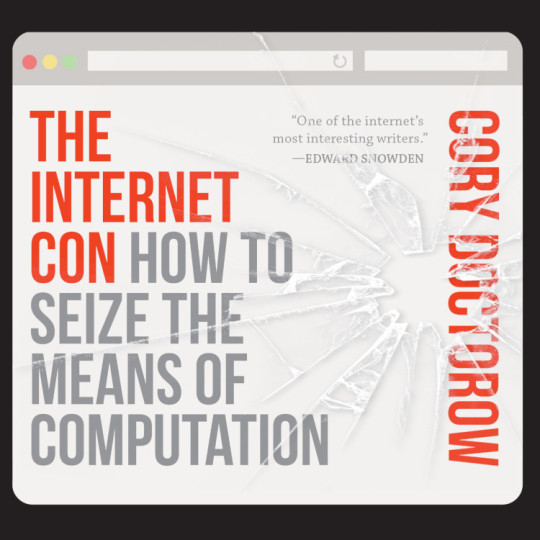
I’m kickstarting the audiobook for “The Internet Con: How To Seize the Means of Computation,” a Big Tech disassembly manual to disenshittify the web and bring back the old, good internet. It’s a DRM-free book, which means Audible won’t carry it, so this crowdfunder is essential. Back now to get the audio, Verso hardcover and ebook:
http://seizethemeansofcomputation.org

If you'd like an essay-formatted version of this thread to read or share, here's a link to it on pluralistic.net, my surveillance-free, ad-free, tracker-free blog:
https://pluralistic.net/2023/08/05/any-metric-becomes-a-target/#hca

[Image ID: An industrial meat-grinder. A sick man, propped up with pillows, is being carried up its conveyor towards its hopper. Ground meat comes out of the other end. It bears the logo of HCA healthcare. A pool of blood spreads out below it.]

Image:
Seydelmann (modified)
https://commons.wikimedia.org/wiki/File:GW300_1.jpg
CC BY 3.0
https://creativecommons.org/licenses/by-sa/3.0/deed.en
#pluralistic#hca healthcare#Gretchen Morgenson incentives matter#death panels#medicare for all#ibm watson#the algorithm#algorithmic harms#palliative care#hospice#hospice care#business#incentives matter#any metric becomes a target#goodhart's law
539 notes
·
View notes
Note
One of my biggest annoyances is leftists and communists beinging up Biden’s tweets during the 2020 campaign of things he said he would do, and being like “see?? he didn’t deliver on anything and this is why you shouldn’t vote for the Dems again” Like, for all the understanding they seem to have of communist or marxist or whatever theory, the idea that the President is not a king and can’t do whatever he wants without Congress’s approval is lost on them?? He still believes in those things but if Congress won’t pass the legislation what is he supposed to do? EOs won’t solve all our problems.
Yeah. Not even to mention, the claim that "Biden hasn't done/delivered anything!!!" is a big fat lie, as people keep pointing out the things he has done, with a razor-thin House majority (until 2022) and two "Democratic" senators who torpedoed everything and one of whom has now literally left the party (Manchin and Sinema). So while Online Leftists obviously don't understand the difference between "achieving all of his campaign goals" and "achieving some," for the last frikkin time, Biden has done a lot of good things in very bad circumstances!!!!!! Using "he didn't do everything!!!!" as an excuse to not vote and so enable the open and unrepentant fascists is the stupidest fucking thing I have ever heard!!!!
Like. Take the debt deal. As in other things, Biden clearly learned from Obama's mistake (which was believing that the Republicans would ever negotiate in good faith about anything, and/or would reciprocate in kind if Biden made concessions). McCarthy whined for WEEKS that Biden wasn't listening and wasn't talking to him and wasn't entertaining his ridiculous proposals (22% cuts in ALL discretionary/non-military spending, including Social Security, Medicare, etc etc, while preserving the giant Trump tax cuts for the rich.) No matter that a full one-quarter of the national debt ($7.8 trillion of $31 trillion) was racked up under Trump and the debt ceiling involves paying bills that have already been spent. No sir, those Damn Free-Spending Democrats wanted to use your money on icky things like ~social welfare!! It was mean and it was hypocritical and it was blindingly obvious, and Biden just completely ignored it. He didn't try to negotiate in good faith with that, because there was no way it would work. He just let them whine.
Then, when it came down to it, Biden went in and got a deal that preserves pretty much all of the Democrats' major legislative priorities and expansions from the last two years. The only real change is raising the work requirement age for childless adults on SNAP food assistance from 49 to 54, but this has also been accompanied by a corresponding expansion of the definition "homeless" to make more people eligible, some for the first time ever. There's not going to be any major new spending for the next two years, but that wasn't happening anyway since the GOP controls the House and wouldn't agree to anything Biden put in the budget (and plus, none of the money that has already been allocated through the American Rescue Plan and other federal assistance is getting taken away). But more importantly, it raises the debt ceiling for the next TWO years and it won't come up again until after 2024. That is HUGE: the GOP really, REALLY wanted to hold the economy hostage again prior to the next presidential election. But Biden basically went in and told McCarthy to stfu and got what he wanted. Qevin was even forced, after months of "Sleepy Joe" GOP propaganda, to call Biden "very smart and very tough" in the negotiations. Soooo.
Anyway, this is what I mean: this isn't as sexy and/or as utterly fucking useless as spouting lukewarm rebaked "Marxist" propaganda on the Twittermachine about how Biden hasn't done anything, but it's the actual nitty-gritty work of government and flat-out beating the Republicans. They got absolutely shit-all that they wanted, because Biden didn't fall for their same old, same old dirty tricks and disingenuous squealing. He went in, got the job done, and will get way less credit for it than he deserves, from anyone. Dunno about you, but I like that guy. I plan to vote for him again.
603 notes
·
View notes
Text

So, I've talked about these bad bipartisan internet bills in the US Senate before, which all more or less boil down to "censorship in the name of Protect The Childrens," but I think it's important now more than ever to boost efforts to fight them because, as of today (5/9/2023), there's a major push planned by the folks lobbying for these bills, and we need to push back.
Thusly, here's a propaganda poster with the URL of the main hub to fight against those bills.
As a primer on said internet bills for those who don't know:
KOSA- Aims to create a "duty of care" towards minors that would de-facto mandate incredibly intrusive age gating via drivers' licenses or fucking face scanning to identify said minors, and would likely lead to lots of censorship. Extremely dangerous right now because the people who want it are pushing hard, and it's got a depressing amount of bipartisan support due to the Protect The Children thing shutting off people's brains.
EARN IT- Will remove Section230 for sites that supposedly let CSAM exist on their servers for too long, which might sound good until you remember the inherent difficulties in moderating that on big social media sites that means what they're asking is literally impossible and also the fact that the last time they tried something like this we got FOSTA-SESTA and its associated censorship wave. Extremely dangerous because it's passed out of committee
RESTRICT ACT- The "ban TikTok" bill that basically gives the us government carte-blanche to censor foreign sites they don't like.
STOP CSAM ACT- A similar act to KOSA and EARN IT that is pretty directly designed to weaken encryption, which is dangerous for any marginalized folks especially in a post-Roe era
Beyond the hub for action, badinternetbills.com, if you're in the US, I urge you to call your senators, especially if they're on the Commerce Committee, given that's the one currently looking at KOSA, and even if you can't, boost this to those that can.
And, as per usual with these propaganda posters, this poster is officially, for the sake of spreading it, under a CC0 license. Feel free to spread it, remix it, add links to the bottom, use it as a meme format, do what you will but for gods' sake get the word out!
305 notes
·
View notes
Note
Delete your Threads account. You know what Meta as a company has done, you know the kind of person Mark Zuckerberg is. You've lived through Gamergate, the elections, covid, the fucking lot of it, and yet you're still willingly making an account on Threads. How can you possibly justify that?
Second ask: Scratch that, I hadn't read your most recent posts. Sorry for being so rude.
Third ask: "Still going to keep an eye on it" For what exactly? For it not to be as bad as it is? For it to get even worse before you decide it is wrong? You know who Mark Zuckerberg is. You know what Facebook is. Be up front: you don't actually care or stand for anything, you're only afraid of losing business. Have some dignity.
So you decided to be rude as fuck, "apologize," and then come back and be more rude?
I was incredibly clear in that post of why I am going to keep an eye on Threads, despite the concerns: Twitter was a valuable source of live news, especially during natural disasters, and Threads is the first potentially viable replacement for that. IDK if you actually follow me, but if you do you'll know I do a lot of work around natural disaster communication. Twitter was invaluable as a communication source during natural disasters. Full stop. It is not up for debate. But hey, if you want a source with more authority than a random tumblr blog, here, have a nice shiny research paper:
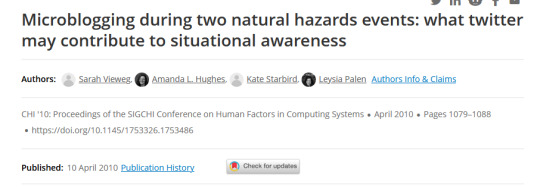
Mind you, that was written in 2010 and the importance of Twitter as a communications tool during natural disasters has only increased since then. There is no other tool out there, no other website--news or otherwise, that can provide such granular, specific updates when shit hits the fan as Twitter did. The only better, quicker source of information I have found during natural disasters is listening to actual radio chatter from the departments involved in whatever problem, and that can be very tricky to do if you don't know where to look or have the right equipment. There is no other site where I can go specifically follow so many of my local fire departments, my local emergency services, my local National Weather System stations, and get live pushed updates from them every single time they post.
When Twitter DDOSed itself last week and put a limit on the amount of tweets people could view and forced people to be logged in to view anything at all, the effect was immediate and BAD. People suddenly couldn't view things like missing person alerts, or weather alerts. I had people messaging me because they were trying to check the National Weather System autoalerts for their area on Twitter due to being caught in a sudden storm, but they couldn't get on to check.
Love it or hate it, Twitter had an immense amount of value and it got that value--at least in the case of natural disaster communication--because the stubborn ass government decided it was big enough to be trusted with official lines of information. Very, very few other social media sites have ever had that trust from the government. Look at how they banned TikTok on all government devices. But they DO trust Facebook, and Instagram, and Meta. Which means their chances of trusting Threads and migrating over there when Twitter finally takes its last breath are ASTRONOMICALLY higher than expecting them to go anywhere else.
We can debate the privacy and moral issues of the Metaverse and those involved until the cows come home, but it does not change the fact that if my mountain is on fire I'm gonna get information about where that fire is from wherever the fuck I can. I'm not going to wait around for it to maybe show up in a "live" updates news article from CNN from some reporter half a continent away in New York who doesn't know anything about where I live and gets the roads wrong because they just don't know. I'm going to go to the website full of my neighbors and local firefighters and see what's happening right that second.
Do we need to fix the privacy and moral issues? Yes. But we can't throw the baby out with the bathwater either. Not using Threads or any other Meta product isn't the answer here. Using them with extreme caution and only for very specific needs, for the time being, is. Long term, we need to be focusing on privacy based legislation that would finally put these companies in their place. But until then, again, I'm going to keep following my local fire departments wherever they go.
P.S.: If you're going to keep the shitty attitude, fuck right off and unfollow+block. You're not wanted here.
#Threads#I was honestly going to make this post anyway due to how some people are tagging the original post#So here#I could honestly debate this all day#lol#But I have shit to do today and right now that is breakfast#Natural Disaster Communication#Twitter#Death of Twitter
230 notes
·
View notes
Text
The Right Are Engineering A Recession In NZ
tumblr isn't very good at local news, which is why i tend to get my nz politics information from elsewhere. so i can confidently tell you that aotearoa under national is totally, utterly fucked. like, not just in terms of all the social progress they plan to undo, though they do very much do plan to do all of that.
national+act+nzfirst have committed to a financial policy that makes zero fucking economic sense. you know how every time the economy is in bad shape, tories sieze the good economic opportunity to slash services or give tax cuts to the rich? imagine if that was happening for just no reason at all. there’s no crisis we’re facing this would even marginally help, but that's what nact+nzfs tax cut policy is anyway.
aotearoa is currently in a cost of living crisis, like much of the world, and our inflation is, to give it it's technical term, "sticky". This means that it's not still shooting up the graph like crazy, but it should have started to go down more by now according to predictions, but it hasn't, and is sitting at an unsustainably high level.
Inflation is bad because it eats away at the value of your money (not something you want generally) but this inflation is especially bad because it's inflation we created to ward off a recession back in 2020. NZ had the hardest and fastest lockdowns in the world, but at a huge cost -- our economy basically stopped overnight. Without goods and services being bought and sold, we would have been plunged into a financial crisis. But instead the government borrowed money to fund the wage subsidy and pay workers through the lockdowns, injecting money into and stimulating the economy.
This was a bill that was always going to come back to bite us, and for the past several years, the Labour government and the Reserve Bank had been playing a balacing game with our economy, steering us between a recession and a wage-price inflation spiral, with a recession definitely being the preferable one of the two. We actually had short soft one that we’ve come out of, exactly what Grant Robertson and Adrien Orr were aiming for.
Recessions can be small or big - inflation spirals are usually just big. We wanted to aim for a "soft" landing recession by hiking interests rates just enough to bring inflation back under control. The Reserve Bank uses it's tool - the Official Cash Rate, or the OCR, which basically sets the price of interest rates across the country, and the government also can use it's powers to create monetary policy to help the economy. A lot of the criticism Labour received before losing the election was about overspending in areas post-pandemic, as putting money into the economy through government spend by using debt to fund it genuinely causes inflation.
What a government should do during a time of inflation is remove money from the economy. For example, a right wing government would often issue an austerity policy, where the cut the amount of government spending through slashing programmes, benefits, staff, etc etc. A government could also increase taxes so people have less money to spend, could pay down government debt, could invest the money into a fund (e.g. NZ has a superannuation fund that's designed to be eventually self-funding set up by Labour that National have paused payments on when getting into government). It doesn't matter too much what, theoretically speaking -- the point is to get the money out of the economy.
What you definitely, definitely don't want to do during a period of high and sticky inflation is put more money into the economy. That would do the opposite of what you want. Labour were rightfully (at some points) criticised for their inflationary policies. So you'd think National would take their criticisms of Labour’s debt blowout and start paying it down to show how responsible they are, right? No, they’re cutting taxes for (mostly) the wealthy while offsetting this with austerity measures to make this “fiscally neutral”. They will make up for the inflationary effects of doling out money to landlords by cutting back essential government services, trying to frame it as a personnel and budget blowout (it’s not) and saying Labour mismanaged the books and we are in terrible financial shape (we are not; we have a triple A credit rating).
And further, it’s becoming increasingly hard to ignore our infrastructure crisis at nearly every level and every location. Our water systems needs billions of dollars of investment that our councils can’t afford to borrow, our rates are shooting up (and so will our rents), our ferries are old and broken down and Nicola Willis Minister of Finance just canned the “too expensive” deal that was needed to replace them — with most of the money going to into wharf upgrades that are desperately needed. There was a huge sunk cost; we’re not going to be able to to buy shit now. The ferries link the North and the South Island and are vital infrastructure; when they break down (which they did multiple times last year) it causes chaos and brings things to a standstill.
Why are they doing this? Land. It’s always about fucking land. All of National have divested in shares and have bought into land under the guise of this removing the “conflict of interest” that would exist if they had invested into specific companies. The usual alternative that solves this is a blind trust, but that’s not what most of the caucus has money in. Luxon alone sold about 12 million dollars worth of Air NZ shares and now has a property profile worth 20+ million. Oh, and he’s charging the taxpayer $50,000 a year to live in his own house. Thats 2.5 times what I get on the benefit that he’s cutting and putting sanctions on.
Nact don’t care if businesses go under and share prices crash; they’ll just sell their houses and buy stocks for cheaper. Their only concern is propping up the housing market ponzi scheme that they have all invested at the top of. This is why they’ve allowed councils to opt out of densification requirements and why they cut back the brightline test and are trying to boost the population with migrant workers; all of these things make house prices go up, make housing better for investors who make millions in untaxed capital gains.
NACT will not let the property market crash any further. Despite what they’re saying out loud, they actually want it to increase.
And they’re more than happy to wreck the economy to do it.
80 notes
·
View notes
Text
An Unlikely Friendship betrayed
Mordecai being repressed as all hell and having feelings for the first time in his life for his straight best friend and not dealing with that very well is of course pure delicious angst
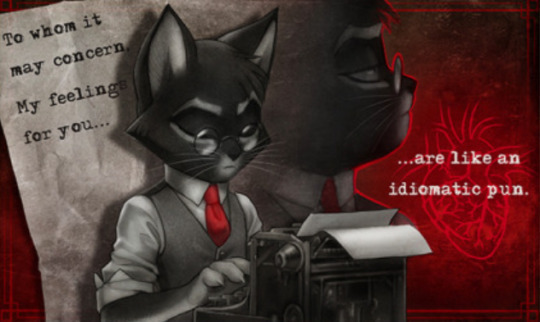
But even with an entirely platonic attitude to the tuxedo that doesn't necessarily mean Viktor is less hurt by what happened

Viktor is a man who has always wanted to feel useful and needed. As a farm hand, as a soldier, as a manual labourer, as a handyman for his neighborhood, and as a bootlegger.
But unable to return to the land of his birth, tossed aside by the US government after serving his purpose in the war, losing an eye when striking for fairer pay and conditions, abandoned by his wife who took his daughter with her, Viktor has had that sense of purpose snatched away from him too many times. He starts working for Atlas as much because it offers him a new one as much as any gratitude he had for getting him out of custody.
A BIG part of that new purpose became watching out for and guarding the back of a younger tuxedo cat, trying so hard to appear cold and capable to conceal the desperate lost man inside. For whatever reason, despite all his noise, nagging, criticism, prickliness,and their regular arguements, this unlikely partner he spends most of his time with somehow achieves that rare feat of being considered a friend by Viktor "Vinegar" Vasko
He makes sure he isn't taking needless risks, he goes out of his way to retrieve his eye wear from half way up destroyed stairs in a burning building,he tries to help him improve his weak social skills, he wears a tie he offers him for Christmas, and seemingly even agrees to wearing a matching suit at the 1926 New Years party despite hating formal wear

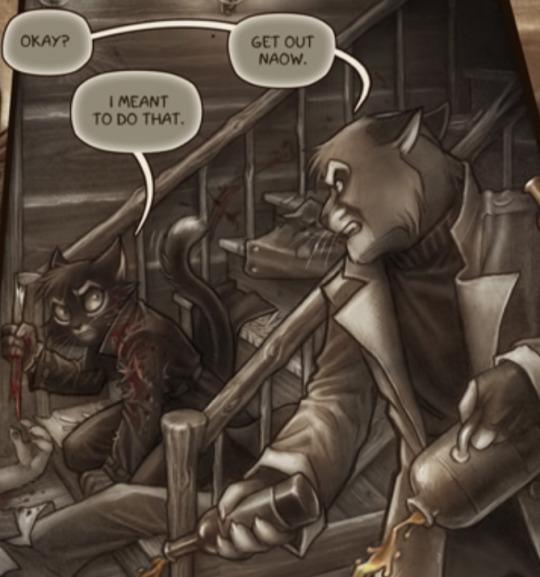
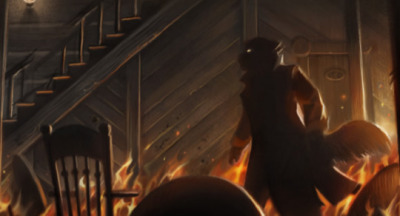
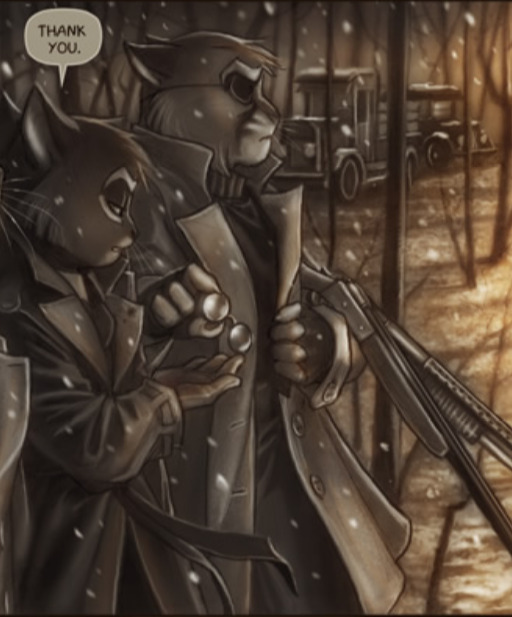
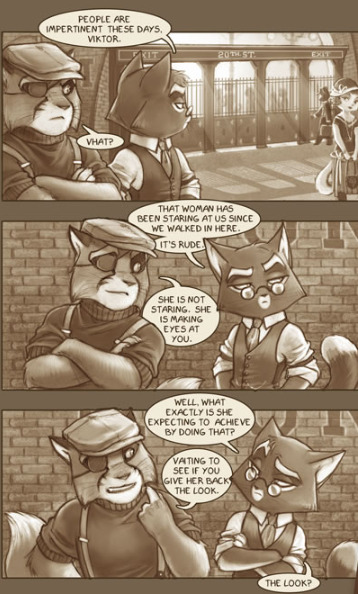
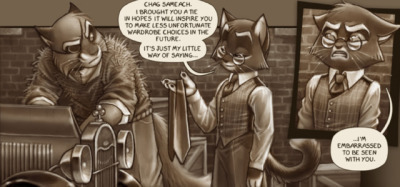


He has a practical purpose as a mechanic, gunman and the muscle of the Lackadaisy gang, while more personally his circle is not much bigger than Mordecai's.
A good hearted but senile neighbor in Mrs Bapka, a young bright eyed girl who fills the gap where his daughter was, and his eccentric partner and likely both best and only friend.
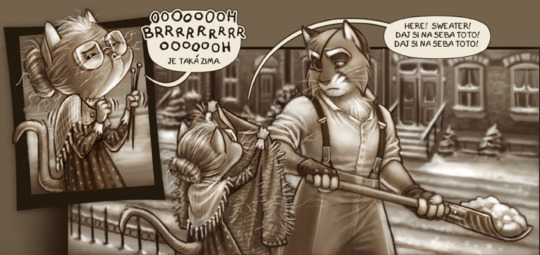

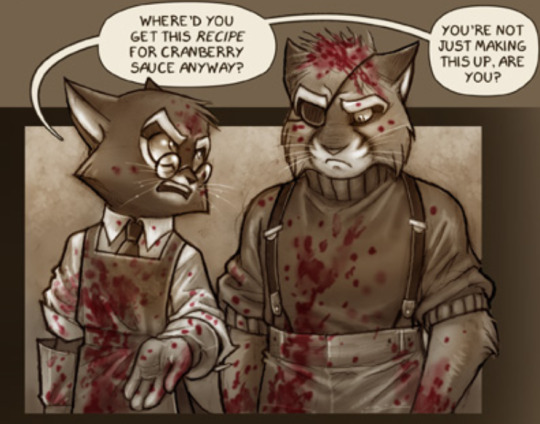
But then Atlas dies, and not long after one of those people puts a bullet in his one fully working knee. We don't know to what extent if any Mordecai explained himself beforehand, but we have to assume Viktor believes like most other people that is was pure spite and self interest as he left them for their biggest rivals.
Not knowing it was a desperate measure to protect him
Now neither of his legs work properly, he is relegated to tending the bar which he must feel is as bad as being benched completely, and following the pig farmers attack, in part due to the robbery of their weapons by that same ex-partner, he currently can't even do that
He is left sitting at home feeling broken and useless without a clear purpose to keep him going, to distract him from the many bad memories hanging over him
All because of the one person he thought, after so many years, wouldn't abandon him, needed him, would always have his back
Not stick a knife in it.
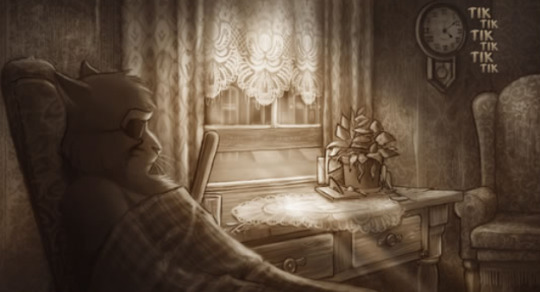
based on response to post by @felinelun
#lets not forget that even in a one sided Vikdecai scenario Viktor can be heartbroken in a different way#lackadaisy#tracy j butler#lackadaisycats#mordecai heller#viktor vasko#vikdecai#lackadaisy cats#mrs bapka#ivy pepper#atlas may#mitzi may
76 notes
·
View notes
Text
I have multiple favorite characters. They're all equally beloved. I don't get to choose which one of them is on the spotlight - they come and go on their own.
Because of this, I have assigned a personal meaning to each character: this character means have more fun; this character means that keep your eyes on the price; this character means a time of transition; this character asks to rest more. Always works!
A month ago, Dragunov from Tekken appeared on the spotlight (this didn't happen with Tekken 7 so we can't blame the new Tekken being out).
Now, the first time he was on a spotlight was 15 years ago. I was in a horrible place back then. There was a legal mess which, if the shit hit the fan, would ruin the rest of my life. Literally. I wouldn't be able to get a rental apartment, make any new contracts like electricity, phone, internet, buy anything with monthly payments, get subscription services, I would lose part of my income. I was THIS CLOSE to lose it all and the worst thing was that there was nothing I could. I hadn't caused the mess but I had no way out of it either. I even went to a lawyer to ask for a legal help but he couldn't help.
I feared for my life and future, hoping it would turn out OK. What kept me sane was playing Tekken 6. I played it hours every day and always as Dragunov. I even did my art school final thesis of fan culture and Dragunov (I had much fun with a Russian fan who drew really pretty pics of Dragunov and gave me an access to her screencapture collection of Tekken 6 for my thesis)

Then, one day I figured what was Dragunov's assigned meaning; you will survive. No matter what the odds, even if it was the 3rd world war, you will survive and come out alive without any harm.
That's exactly what happened. Took 2 more years but I got out alive, unharmed. It was horrible time. I'm glad it's over.
So, when Dragunov NOW suddenly appeared on the spotlight after 15 years, my initial thought was "WHAT WHAT, WHAT'S THE BAD NEWS??? WHAT'S GOING TO HAPPEN?? WHAT DO YOU MEAN THE ODDS ARE HORRIBLE BUT I'LL SURVIVE????! "
Two weeks later, in a span of a week, without any prior warnings:
I got laid off because the company bankruptcy and fell on a social welfare
this happened while the current right-wing government made big cuts to social welfare and housing benefits (so I don't know if I can keep my current home)
while at the same time prices keep getting higher due to inflation
The IUD for anemia treatment came out on its own
Because of that I'm without any help to my iron anemia and the only solution will be hysterectomy in my case; doctors aren't giving those easily (even when needed)
I lost my workplace healthcare which would have been the easiest and the best way to get to hysterectomy
the sudden removal of IUD is causing me horrible withdrawal symptoms
my Japanese friend told me that she's unable to come to Finland this year and has to postpone her trip till 2025 :(((
(which also means I won't get my favorite cigarettes I smoke for fancy treats a few times a year because I can only get it from Japan - ordering tobacco online is illegal here)
noticed that wasps had made a nest to my balcony (that's being taken care off)
couldn't attend a free(!) ice-cream tasting for a feedback and for a free 15€ gift card because of the IUD withdrawal symptoms
found out that trains aren't operating normally and my home station is under construction and causes some issues
So yeah. He wasn't lying. It's been so bad that the first thing this morning when waking up was to take stomach medicine and have a smoke. And I'm not a smoker.
Horrible times are up ahead but I trust that I'll survive out of this phase just like I did 15 year ago.
(:::з」∠)
39 notes
·
View notes
Text
@snazzyjazzsounds
it’s weird how for much of human history “democracy” was just like. technologically unfeasible within a medium sized state.
on the one hand i’m a big fan of, like, material conditions as an explanatory factor for social and political structures. on the other, i’m wary of letting the dicks of history off for their dickishness, as if it was impossible to know or nobody ever suggested that war and slavery and exploitation were bad, because, y’know, they did.
i think the paucity of something we might call democracies in the ancient world is due to several factors:
1) states originating as wealth-extraction machines. the earliest states seem to have approximately in common the monopolization of a valuable resource, as in hydraulic despotism, and a degree of keeping people in place by force, so elites can glean the excess of farmers and live without having to do food production themselves. sometimes this supports things people consider to be socially valuable activities, like the upkeep of temples, and sometimes not. but if you want to live in an egalitarian society, even one with villages and farming and whatnot, your best option is the extremely vast territory outside the control of organized states, which at least back in the beginning of Sumerian civilization is, like, most of the Earth. States compete over resources and optimize for better resource extraction, and more sophisticated hierarchies and ideologies that enable them to control larger territories, but the goal of “roughly egalitarian society without a ton of coercion” is exclusive with the goal of “live within the boundaries of a state.”
and i think a lot of ancient commentators noticed this; this is why the Tao Te Ching seems so down on the whole idea of statecraft to begin with, and why it paints the picture of an ideal society being one where the people of one state can hear the dogs barking in the next state over, but have never met those people face to face in their lives. because it was written in a period of fierce inter-state competition, and it did not escape the authors’ notice that states were mostly a bad deal for the people who lived under them.
(as we might also notice of the Roman Republic and Ancient Greece, even “democratic” forms of government were ways of brokering power-sharing between elites; most people living in ancient democracies had no ability to participate in their political systems.)
2) infrastructure is expensive, communication is hard. as you note, how the fuck do you coordinate a medium-sized democracy when it takes days to get a message from one end of your state to the other? on the one hand, yes, very big states did exist in this period, like persia. as did states with comparatively well developed apparatuses, like rome. but a lot of how big states operated historically was delegating to local elites--you tax the big men in the province you just conquered, and trust them to figure out how to get the most money out of their peasants. our modern idea of democracy is in many ways predicated on our modern idea of a state, which is somewhat different an animal than an axial-age kingdom!
and a big part of why this is so difficult i feel like has to be linked to the small size of towns, which is linked to the fact that most of the population had to be farming, because the amount of extractable surplus from the rural population was small.
for centuries--longer than the industrial revolution itself, maybe since the late middle ages--my sense is that the yield per farmer has been gradually increasing, which in addition to the population growth enabled since the industrial revolution itself has really vastly increased the amount of time we can spend on things other than producing food. and i suspect that that means states have a lot bigger pool of manpower available to them to assist in their administration, and gives them the capacity to do things like be run for the benefit of a larger subset of their population--and in turn for the population to demand that they be run that way.
3) i suspect lots of ancient societies were run in ways we would approve of, i.e., comparatively egalitarian, not terribly exploitative. i also suspect these societies didn’t look much like (their neighboring) states. you’re not building pyramids for the pharoah if you don’t have pharoahs after all. your court officials are not writing histories of your dynasty if you have no court and no dynasts. so these societies, along with very many others, leave less of a historical impression.
but i don’t want to overly romanticize the past; lots of societies that left no lasting historical record also probably sucked ass. slavery is observed even among hunter gatherers. humans can be real dicks, and we have, as terry pratchett noted, a really unfortunate tendency to bend at the knees.
108 notes
·
View notes
Note
I have a very genuine question about the tipping post I promise I didnt read it in bad faith: are people who simply cannot afford to tip not “allowed” to eat out? I’m just thinking about how it works where I am from and while tipping is the norm here if someone doesn’t tip because they can’t afford it it really isn’t a big deal (+tipping norm here us only 10%). so if a poor family goes out to eat to celebrate something and they can barely afford the meal would they still be expected to tip 20% because they shouldn’t eat out if they cant afford it? thank you in advance I’m really curious
If it helps, don’t think of the tip as a separate thing. It is part of the cost of your meal. So if you cannot afford to pay for the cost of the meal including the tip you cannot afford to eat at that restaurant. This is something I myself have to calculate when I’m deciding if I want to eat at a particular restaurant- if I have $15 I can’t go to a restaurant and order a $20 entrée and then refuse to pay the remaining cost, and likewise if I have $15 I can’t order a $15 entrée and expect not to pay the server for their service.
Now that doesn't mean families who can't afford a pricy restaurant can't eat out at all. Since it is a % of your bill you can try to go for a cheaper restaurant (smaller bill = smaller tip), or if you go to a counter service place where you serve yourself you’re not expected to tip 20% (sometimes they have a jar out you could kindly throw a dollar or more in, but there is much less expectation to tip because the workers at a place like that receive a full minimum wage, more on that in a sec). I will also say in my lived experience poor families in America understand and tip well, I’ve almost exclusively been under tipped by wealthy people (which is what kicked off the debate on twitter- if your bill is $700 then you obviously can afford to tip a full 20%, no destitute families are spending $700 on one meal).
Technically speaking you can get away with 18% as a tip, and if you go down to 15% your waiter will think you’re cheap and be annoyed (15% definitely implies you were unhappy with their service) but that is the lowest possible threshold of acceptability. 10% is not an acceptable rate here, and 20% is now the expected norm for good service, and going up from there for great service. And I would never, ever not tip at all. I can only imagine not tipping if like the server had done something deeply offensive or dangerous or something. I've never encountered a situation where I felt the server didn't deserve any tip at all.
Because you’ve asked in genuine good faith I’m going to provide some more context to help you understand a bit more why this is the way it is-
Waitstaff in america are wildly underpaid. Our federal government assumes the tips are part of their expected income, and so a) they are taxed on assumed tips and b) it is legal to pay them less than standard minimum wage. Currently the tipped federal minimum wage is $2.13/hr. Now, states set their own individual rates so some states do better, but $2.13/hr is the lowest they can all legally go. And you’ll notice in that link it mentions the assumed tips and taxing them. I said on my original post, when I worked as a tipped waitress I made $2.68/hr and sometimes my biweekly paycheck was like $60 total. Imagine trying to survive on $120 a month, you absolutely cannot. Tips made up my actual wage, and were the paycheck I depended on to pay for my basic needs. I relied directly on customers to choose to do the social convention of tipping for survival, and when someone would choose to do otherwise it was utterly devastating.
Another thing customers sometimes don’t realize is your waiter may not be allowed to keep all of the tip themselves. It’s a common practice to pool tips amongst all the waitstaff and then divide them equally, and many places require that you tip out other employees there. So if you give me $10 as a tip I might be actually giving a large chunk of that to bussers, bartenders, etc. Or maybe we pool tips and someone else stiffed my colleague so now all of us are sharing your $10 tip. So also keep in mind that the money you leave as a tip very often does not go entirely to the actual waiter, so a big tip can actually become pretty small much faster than you would think.
(and that's just legal practices, wage theft and illegal practices run rampant in the restaurant industry, just fyi)
If you are wondering why tipping culture here is so grim, it is because of slavery. Tipping got big here as a way to keep forcing Black Americans into working for free, now with a small tip but still no actual wage. It was designed for oppression. Waitstaff are overwhelmingly not wealthy people. It is very common for them to be on food stamps, require housing assistance, or to otherwise be living under the poverty line. If you are eating out and not tipping because you yourself are poor, you are taking money out of someone else’s poverty wages to do so. When we debate minimum wage here in america, conservatives are really good at painting a picture of waitstaff being perky middle class college kids making an extra buck, or teens from wealthy homes wanting some spending money. There is an implication that they don't really need the money that badly. That is not the reality of who makes up most serving jobs in america. Minimum wage workers are likely to be in poverty, they’re likely to be women and specifically they’re likely to be women of color. Americans of color are significantly more likely to be working at minimum wage than white americans. There is a pretty sizeable number of minimum wage workers who are over 50, and a not insignificant amount of them who are mothers who support their families. There are also those teens who just want extra cash, and they deserve good compensation for their hard work too, don’t get me wrong, but they are only a portion of who makes up the minimum wage workforce.
If you’re like “But that’s such a shitty system, you’re saying it’s pitting poor people against each other for basic human comforts!” yup. I 100% agree. I am a vocal proponent of raising the minimum wage for that reason. I also advocate for a Universal Basic Income, because I understand that when it comes to small mom & pop restaurants the owners aren’t always making a ton of money either and it seems like truly no one is winning in this system. It is set up to oppress and to demean and to grind us all down. There are lots of orgs in America that are fighting to improve the system, or to radically change the system. There are also restaurants that have tried to do things differently- there’s a wine bar in my city that says specifically on their menu that their wine is more expensive because they pay their workers a true livable wage so there is no tipping there. Instead as a customer I pay a higher upfront cost that covers the true expense of running the bar- including server wages. I love that, I wish more places would do things like that. In the meantime, when I’m choosing where to eat I factor in a tip of 20% when calculating my estimated bill, because paying for service is part of the cost.
Refusing to tip fully in america is not doing anything to change the system. It does not make restaurant owners rethink their pay structure, it does not put pressure on our government to fix minimum wage, it does not make a political statement. It just means your server is going home wondering if they can afford their own meal that night.
Thank you for asking for clarity, I hope this helps. Please feel free to ask more if you have any remaining confusion or are curious about other aspects of american culture. If I can answer and the questions are respectful, I am happy to reply!
#also fwiw#you know those big american chain restaurants people like to make fun of?#like olive garden or red lobster or applebees or whatever?#a lot of the appeal of those types of restaurants is they make a big production over you as a customer like you're at a high end restaurant#but the prices are much lower than an actual nice restaurant#so that is why so many americans view going to outback steakhouse as a big treat#it's not that we don't know what a good steakhouse is#it's that those places give you that service but your steak is $20.99#and if you are like 'ha! my family wishes they could afford chilis"#no yeah those places are not cheap i feel you#but that's exactly the appeal of those big chains#a real nyc steakhouse starts at like $40 for steaks#and goes up from there#now look at outback's menu#now you get it?#so yeah if you're not a wealthy family and you have a celebration coming up you look for a restaurant in that vein
160 notes
·
View notes
Note
what gets me is whenever any of these people says not to vote, and you ask them what the alternative is, they usually throw some tantrum about how it shouldn't be their job to fix this country and they're not expected to know (or start calling you a neoliberal or a bootlicker lmao) and i just. i don't get that? not voting, especially in the current climate, is a big deal. i don't think it's unreasonable to ask anyone who advocates for that what the alternative is. i'm not expecting you, online leftist, to magically know how to fix everything. i am expecting something from you if you're gonna tell me not to vote, especially when we both know that helps the gop. like, how dare we ask them to defend this big choice they're telling us to make?
their position boils down to helping trump and the republicans but any time you remind them of that they get upset. what is the alternative? what plan do they have? it would be one thing if there was another option that they'd come up with, but they haven't and don't seem interested in doing so. mutual aid and organizing is only going to take us so far and it'll be a hell of a lot easier to do it with biden in office than trump
The whole "it doesn't matter who's president/in charge of the government because mutual aid and organizing is the only valid way to do community engagement" is the leftist version of the Brexit nutcases who, and I swear I am not making this up, argued that it was fine if the UK left the EU trading sphere/single market/customs union with nothing to replace it, because "Britain is a nation of farmers and can grow food in our back gardens!!!!" Yes, because you're so devoted to your stupid ideology that you think the large-scale collapse of society, a major world power, a western democracy, and everything else will have no effect, and you can just do your little Facebook mutual aid groups and happily shout on Twitter at anyone who disagrees with you. Never mind the fact that this would obviously and immediately harm vulnerable people the most and that nobody, not even the Online Leftists themselves, actually wants to live in the Violent Revolution Total Anarchy World they masturbate to. Maybe this makes me a neoliberal corporate shill, but I'd rather that the world got better, instead of worse. I would actually prefer that myself, my friends, my family, my whole life, the whole country, and the rest of the world wasn't sacrificed on the Great Revolution Altar, but I shouldn't worry. We have mutual aid. At least as long as a) you have never said anything the Online Leftists even slightly disagree with, since they're sure as hell not the kind of people I would trust to have my back in any large-scale societal collapse, and b) I guess they'll all be growing food in their back gardens too, rather than using any of those dirty "government" or "society" things to supply their basic needs. We're saved! No need to worry. Bring on the anarchy.
Aside from the fact that Online Leftists, as I have said before, think that moral action begins and ends with posting the Right Opinions on social media at the correct timeframe and any other action or engagement with a flawed system or basic reality is heresy, they don't like being challenged -- i.e. "if we don't vote, then what do we do?" -- because a) it questions their authority as supreme arbiters of morality, and b) it means that there should actually be an action in place of cutting out something so consequential as voting, which likewise clashes with their "everything will be fixed by Magical Thinking" viewpoint. They don't want to be asked what to do in place of voting, or in anything at all; they want to think their correct thoughts and judge anyone who doesn't, regardless of how logically incoherent these things are or the inevitable outcome of those decisions, because nothing bad is ever their fault, or even the Republicans' fault, or anyone else at all except for the Democrats and/or "the West." I mean, yeah, if they're going around to preach the Don't Vote Because It's Actually Evil gospel, it's the bare fucking minimum to expect that they have something to offer in return besides Ye Olde Bolshevik cosplay fantasies. Since they don't, they get tetchy when you point that out.
Also, while I know it's the social media fashion that everything has to be the worst thing ever and we have plenty of the "Biden is also a genocidal fascist but I guess vote for him or something" utterly-minimum-standard posts going around, I will point out why that rhetoric is a) wrong and b) unhelpful. (Not that I expect it will make a single difference to anyone who has to get their internet cred by yelling about how Biden is a fascist, but still.) No, Biden is not a fascist by any logical definition of the word, you would have to do a lot of work to convince me that he is personally genocidal beyond what is demanded of any post-1948 American president who exists in an extremely complicated international sphere with long-standing alliances (such as, yes, with Israel) and indeed not quite a bit more progressive than literally every one of his predecessors, and it makes those actual words useless. If you claim that "Biden and Trump are both genocidal fascists," you are utterly effacing those categories as any kind of critical or useful distinction. You can't argue for any difference, you can't point out policy essentials or nuances, you can't make the most basic of empirical observances or come to a judgment on whether any part of that statement is true, because language has been deliberately stripped of meaning and used to score Cool Internet Leftist points. How can we explain what fascism or genocide actually are and what to do about them, if it's just what you call everyone as a matter of course whenever they disagree with you? You can't. That's the point.
Once again: I strongly disagree with the idea of just giving Israel/Netanyahu a blank check to keep committing atrocities, but I also need to repeatedly point out that Biden isn't doing that. His initial unconditional support of Israel after October 7 (which at the time was the correct response) has shifted to a much more measured and conditional approach where he has muted the overtly pro-Israel statements and started talking about a two-state solution and the need to protect the lives of civilians and trying to keep a lid on what could become a REALLY bad situation with all kinds of war-hungry powers eager to jump into the Middle East and blow it completely to hell. As I have said in my other posts, Trump will not do this. Trump will do the exact opposite. Which is why Netanyahu, who doesn't like having his hands tied precisely in the way Biden is doing, is trying so hard to get Trump back in. This also extends to the people who think that the West/the U.S. is the source of all evil in the world, but they're somehow the only people that can make actual choices or have real agency. Everyone else is just an American puppet; everyone is being lied to or manipulated by America/the West; nobody ever chose anything of their own free will; America/the West could roll in and put a stop to everything bad if they "really wanted to," but choose not to because etc. etc., Evil. As such, this completely fact-free belief is basically the central starting point for Online Leftism, which as I have also said, is now beyond useless and verging on just as deranged and actively dangerous as the fascists, especially since they are 100% willing to enable far-right fascism however and whenever they can because something something, That Will Show Us.
Anyway. Yes. Whew.
#anonymous#ask#politics for ts#israel hamas war#okay i think i'm done talking about this for today#but yes
147 notes
·
View notes
Text
Extremely specific neurodivergent curtwen headcanons that crack me like an egg:
ADHD Agent Mega is practically fan canon at this point, but I feel like we focus on him being bored & fidgeting more than other ADHD issues. Like I imagine so much of his macho guy bluster is 1. from being gay in a homophobic society, but also 2. From Rejection Sensitive Dysphoria. I dunno, something about the way he gets so flustered and defensive when people criticize him (which happens constantly)?
I've been thinking about maybe Curt being dyslexic? Like maybe he doesn't read briefings because they're already difficult to focus on, but also they're literally difficult to read? He mixes up information no matter how hard he tries. He's learned to stop trying and pretend he's just too cool for that nerd shit, but whenever someone gives him a hard time for screwing up he takes it really really personally? He has big emotional outbursts, which is especially tough as a closeted gay man in the 1950s-1960s
I have a lot of headcanon about autistic Owen Carvour, but it's kinda weird because he's canonically the villain of SAF, and that tends to stray uncomfortably into "he was always a monster" OR "the fall made him into a monster." So with autistic Owen headcanon it veers too close to saying that being autistic made him a monster (yikes, no) or that becoming disabled (no way in hell he doesn't have chronic pain issues after all that) made him a monster (also yikes, no).
So for me, the way that I frame it is like... okay so Owen is literally masking in the show, but I think about what that says about him that one of the major details we know about him is that he is very good at pretending to be other people. I'm a heavily masked autist myself, so this really resonates with me. With autistic men there are some very specific stereotypes like math, bad at social interaction, etc. But I think Owen would have a profile more stereotypically attributed to women: being hyper aware of everything around him, using "movie talk" or just remembering interactions with others and having a script. I don't know how to explain it exactly, but it's like you enter a situation and you can more or less suss out what people are expecting from you in that situation, so you just flip through your mental rolodex of phrases and deliveries and ways to stand and hold your face that align with their expectations of you. You become adept at blending in.
I would fully believe that Owen reads every briefing multiple times and has charts and diagrams, and maybe before the fall part of why he does that is that he knows Curt is a talented agent but just struggles with that part of the job, and Owen feels protective of him. Like he gets that Curt is impulsive and feels the need to be a counterweight to that. It feels like Curt blocks out information and takes in stimuli, and Owen blocks out stimuli but takes in as much info as humanly possible.
Then there's all the villain shit obviously. This is extreme headcanon territory, but one part of being autistic is what they call the "autistic sense of justice." That absolutely does not mean that autistic people have some preternatural ability to be eternally on the right side of history, we all have our individual identities and experiences coloring what we consider "justice," but just on a personal level being autistic and becoming disabled radicalized me. It led to me becoming anti-capitalist & anti-imperialist. It drastically changed my perception of right and wrong because I had to interrogate my own understanding of power, the way the concept of "crime" is created (like you get jail time for shoplifting, but your boss doesn't get punished at all for stealing money out of your paycheck).
I've already done ridiculous long posts about the political stuff, but I do think that an autistic person, especially one who has gone through a massive trauma, might come through it with a new understanding that the US/UK governments are actually pretty awful, that ignorant brutes shouldn't be in charge of politics and information.
I dunno I probably have more but I've already dumped too much here
24 notes
·
View notes
Text
I noticed something today: there's something so striking and powerful about the mundane.
Like, for example, I saw a post about Palestinian people from 2013; they were enjoying a day at the beach. You can see a father playing with his baby and there's a big crowd behind them, and they're all smiling. It reminded me of my childhood summer holidays.
And it impacted me so much more than all the traumatic pics of children bleeding out in their crying parents' arms.
Now, don't get me wrong: triggering pictures have an impact as well. But is it always a good/helpful impact? This is what happens when I see those: it terrifies me, angers me, saddens me, which is what it aims for, shock value.
But then, I stare, my heart starts racing and I get sick, and I turn off the Social Media and reflect in silence and eventually, I don't do anything because my brain would rather forget. This is selfish, this is human.
Because I can't relate to it, and what I can't relate to I can't understand. And it's so hard to do something about what you can't understand, isn't it? I mean, what kind of a person would treat a child like that? Would even think of doing something so awful, or, on the contrary, think so little about the result that in the end, they choose to do it anyway?
Then, I saw that happy, mundane picture, which is such an unusual way of sharing awareness because people assume that you will want to think about that video of a child bleeding out long enough to do something about it. Which doesn't happen because if it did, then we'd probably get results.
I'm not guilt-tripping/gas-lighting anyone, cause those posts are still important. Everyone has different reactions to everything. So keep posting those, keep sharing and reblogging those. But don't stop there.
I haven't been happy in such a long time. Summer holidays at the beach when my father was still an important part of my life? Those I can relate to. Cause they remind me that what the Israeli government is doing to Palestinian people isn't happening on another planet. They remind me that they're just like us: they had happy days and now it's all gone to shit. Except that their bad days aren't just bad days, they're Hell on Earth.
On another note: pro-Israeli should really stop treating this genocide like it's a football game, and anti-semites using the pro-Palestine "title" to "justify" their behavior/opinions.
#palestine#israel#antisemitism#pro-palestine#gaza#free palestine#free gaza#gaza genocide#palestinian genocide#ceasefire#being pro-israel is just a way of saying you're racist#anti zionisim#palestinian has no army
20 notes
·
View notes